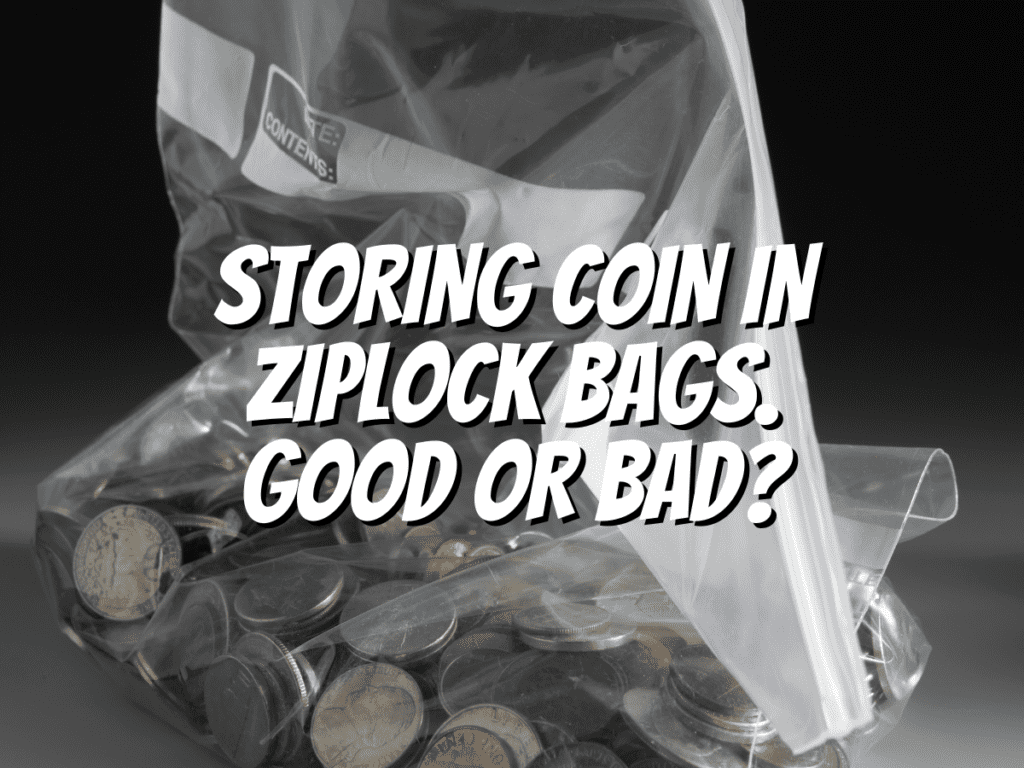As coin collectors, we want to protect our collection from moisture and dirt.
The best way to do this is by using airtight containers that prevent air from getting in and out.
But what if you don’t have any of those? If this sounds like your situation, we have a solution for you!
Storing Coin in Ziplock bags

We don’t recommend storing coins in Ziploc bags. There are several reasons for this.
First, the moisture from the bags can damage your coins over time. This can cause corrosion and tarnish on the coin’s surface or discoloration, making it less attractive.
Second, using a Ziploc bag with a coin inside is very easy to do incorrectly if you aren’t careful.
If you squeeze too hard when closing the bag, you could damage your coin instead of protecting it!
There are much better options for storing your valuable coins—individually sealed plastic containers or cloth pouches with display cases designed specifically for storing precious metals like gold.
Silver bullion bars should work fine as long as they have enough room.
Is Storing Your Coins in Ziploc Bags a Good Idea?
Storing your coin collection in Ziploc bags is not the best way to protect your collection.
If you have a small number of coins, this may be acceptable, but when storing extensive collections or valuable coins, there are better options.
Ziploc bags are not airtight and therefore do not protect against moisture damage. Therefore if you live in an area with humid or wet weather, Ziplocs probably isn’t for you.
They can also tear easily, which exposes the contents and makes them susceptible to damage from scratching and other contaminants, such as dust particles and dirt from outside air exposure.
Another issue with storing coins in Ziplocs is that they make it hard (if not impossible) for you to quickly find what you’re looking for when sorting through your collection if needed because each item must be removed individually before being viewed or handled further by hand which adds time onto any maintenance work that needs doing such as cleaning off tarnish buildup on older silver pieces etc., making it more time consuming than necessary overall.
We Have a Better Alternative for You!

Don’t worry; there are other options you can use to protect your collection. For example, if you’ve got many coins and don’t mind spending a little money on them, consider buying a coin holder.
A suitable coin holder will protect your valuable coins from damage and preserve their value for years.
If you’re looking for something more affordable, try making a coin holder! But make sure it’s not too thick, or else the coin won’t fit inside.
And if possible, try getting one with an opening at the top so it will be easier to take out all your precious coins without spilling them all over the floor!
Our Recommendation

The best way to store your coins is in a safe place to protect them from damage.
The most common reason for damaged coins is exposure to humidity and heat. Other reasons include improper care, handling, storage, and even being dropped on the floor.
To prevent this, we recommend storing your coins in an airtight container that doesn’t allow moisture or dust inside.
This can be done by placing them in their original packaging; if not, look for coin storage, boxes, or holders!
Before you go…
We hope this article has helped you understand why storing your coin collection in ziplock bags is not a good idea. Instead, the best way to protect your collection is by using a coin box, coin holder, or even coin albums!
Check out my next article: “Top 10 Cheap Coin Collection Containers!“
Related Articles:

